
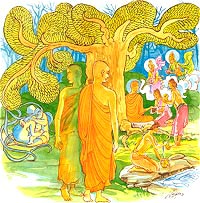
Verse 209. Admiration of Self-Seekers
One makes an effort where none’s due
with nothing done where effort’s due,
one grasps the dear, gives up the Quest
envying those who exert themselves.
Explanation: Being devoted to what is wrong, not being devoted to what is right, abandoning one’s welfare, one goes after pleasures of the senses. Having done so, one envies those who develop themselves.
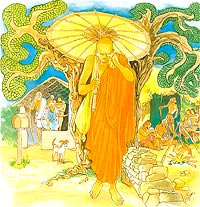
Verse 210. Not Seeing The Liked And Seeing The Unliked Are Both Painful
We who are healthy live
happily midst the unhealthy,
among unhealthy humans
from ill-health dwell we free.
Explanation: Among those sick, afflicted by defilements, we, who are not so afflicted, live happily. Among the sick, we live, unafflicted, in extreme happiness
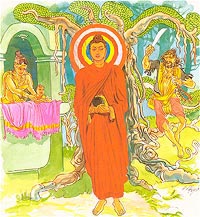
Verse 211. Not Bound By Ties Of Defilements
Others then do not make dear
for hard’s the parting from them.
For whom there is no dear, undear
in them no bonds are found.
Explanation: Therefore, one must not have endearments; because separation is painful. For those who are free of bonds there are no endearments or non-endearments.
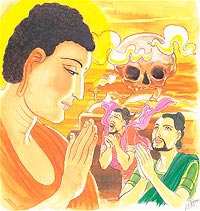
Verse 212. The Outcome Of Endearment
From endearment grief is born,
from endearment fear,
one who is endearment-free
has no grief – how fear.
Explanation: From endearment arises sorrow. From endearment fear arises. For one free of endearment, there is no sorrow. Therefore, how can there be fear for such a person?
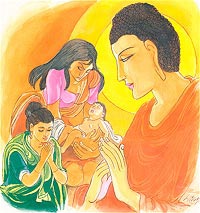
Verse 213. Sorrow And Fear Arise Due To Loved Ones
From affection grief is born,
from affection fear,
one who is affection-free
has no grief – how fear?
Explanation: From affection sorrow arises. From affection fear arises. To one free of affection there is no sorrow. Therefore, how can there be fear for such a person?
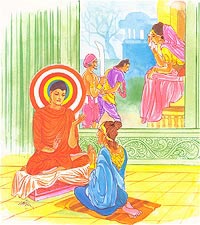
Verse 214. The Outcome Of Passion
From lustfulness arises grief,
from lustfulness springs fear,
one wholly free of lustfulness
has no grief – how fear?
Explanation: From passion arises sorrow. From passion fear arises. To one free of passion there is no sorrow, In such a person how can there be fear?
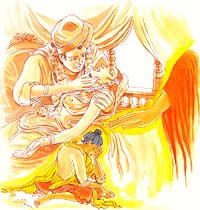
Verse 215. The Outcome Of Lust
From attachment grief is born,
from attachment fear,
one who is attachment-free
has no grief – how fear?
Explanation: From desire arises sorrow. From desire fear arises. To one free of desire there is no sorrow. For such a person how can there be fear?
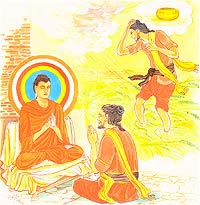
Verse 216. Sorrow And Fear Arise Due To Miserliness
Out of craving grief is born,
out of craving fear,
one fully freed of craving
has no grief – how fear?
Explanation: From craving arises sorrow. From craving fear arises. To one free of craving there is no sorrow. For such a person how can there be fear?
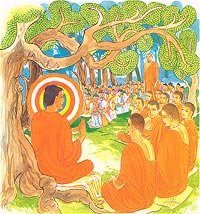
Verse 217. Beloved Of The Masses
Perfect in virtue and insight,
firm in Dhamma, knower of Truth,
dear to the people’s such a one
who does what should be done.
Explanation: He is endowed with discipline and insight. He is firmly established on the laws of righteousness. He speaks the truth. He looks after his worldly and spiritual responsibilities. The masses adore that kind of person.
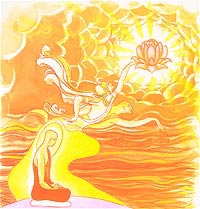
Verse 218. The Person With Higher Urges
One with a wish for the Undeclared,
with mind so well-pervaded,
a mind not bound in pleasures of sense,
an ‘upstream-goer’s’ called.
Explanation: In that person a deep yearning for the undefined – for Nibbana – has arisen. He has already touched it mentally. He is called a swimmer against the current – an upstream-bound person. He has already started the process towards Nibbana.
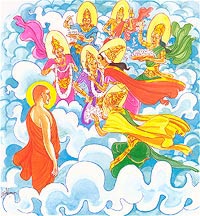
Verse 219. The Fruits Of Good Action
One who’s long away from home
returns in safety from afar,
then friends, well-wishers, kinsmen too
are overjoyed at his return.
Explanation: When a person, who has lived away from home for a long while, returns home safely, his friends, relations and well-wishers welcome him back.
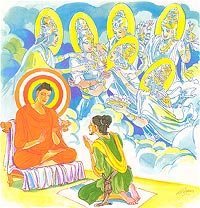
Verse 220. Good Actions Lead To Good Results
In the same way, with merit done
when from this world to another gone
those merits then receive one there
as relatives a dear one come.
Explanation: In the same way, when those who have done meritorious deeds in this world go to the next world, their meritorious actions welcome them, like relatives welcoming back relatives returning from a long journey.

